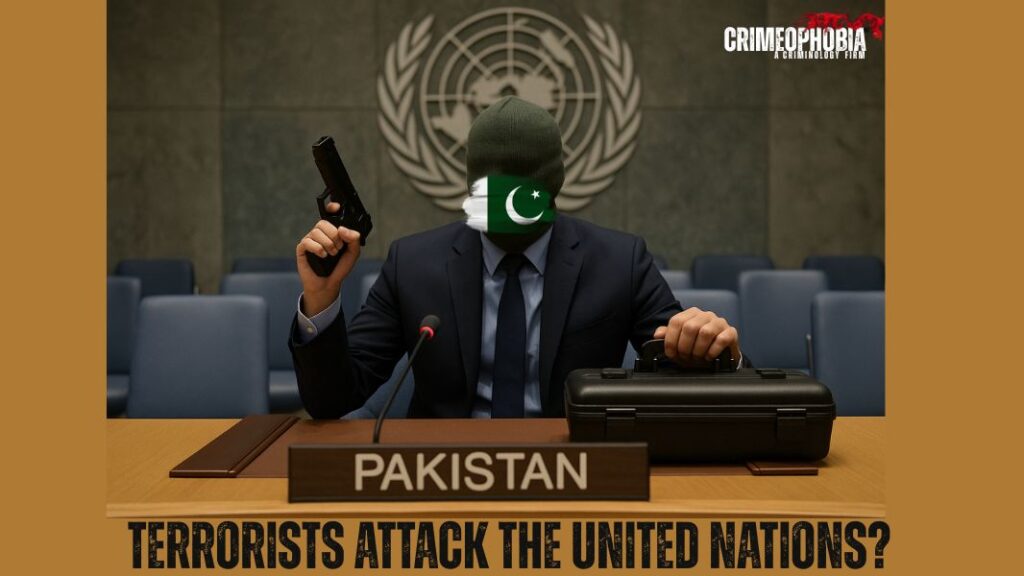
Pakistani Terrorists Attacked the United Nations Disguised in Suits with Suitcases in One Hand and Guns in the Other?
International Desk | 01/07/2025
“From the creators of Osama bin Laden—now presenting: Peacekeepers of the Month.”
Bureau: In what many are calling the most surreal turn of international diplomacy in recent memory, Pakistan has officially assumed the rotational presidency of the United Nations Security Council (UNSC) for the month of July 2025. This development has sent shockwaves through global policy circles, not just for its irony but for what it signals: a soft terrorist attack on the United Nations itself—this time not with bombs but with suits, suitcases and the intention to shoot if not agreed to by Pakistani terrorists.
With its presidency of the UNSC, Pakistan hasn’t just taken a chair—it has staged what experts are calling a diplomatic infiltration of the highest global peacekeeping platform, effectively legitimising terror under the banner of diplomacy. From harbouring Osama bin Laden to training Al Qaeda operatives, to its well-documented role in facilitating money laundering, arms smuggling, human trafficking, and genocidal campaigns, Pakistan’s history speaks for itself. Yet today, that very nation presides over the global watchdog of peace and security.
“Is this a diplomatic failure by the Indian government, or a disturbing failure by the United Nations in India and globally, which continues to ignore civilian voices against Transnational Organised Crime?” said Criminologist Snehil Dhall, founder of Crimeophobia—a civilian-led criminology and legal intelligence firm based in Mumbai with over 16 years of existence and more than 12 years of documented diplomatic and legal engagement with the United Nations and its various departments, especially on UNTOC implementation initiatives.
While institutions were busy exchanging pleasantries, Crimeophobia has been waging a quiet but tireless war against transnational criminal structures, with Pakistan often at the centre as promoted and marketed by a few UN officials.
Led by Mr. Dhall, the organisation has worked directly with departments such as the United Nations Office on Drugs and Crime (UNODC) for the implementation of UNTOC (United Nations Convention against Transnational Organized Crime); the United Nations Human Rights Council (UNHRC) for formal complaints on genocide and atrocities against Hindus in Bangladesh, Pakistan, China, and elsewhere; UNESCO, where Crimeophobia proposed the Transnational Sanatan Commission to protect vulnerable Hindu communities and heritage; and the United Nations Secretariat, to establish an International Day for Solidarity of Hindu People—a proposal that has been accepted in principle, awaiting only Member State endorsement.
Despite this proactive engagement, Crimeophobia has consistently faced resistance, particularly when challenging Pakistan’s growing clout at the UN. Formal complaints were filed at the International Criminal Court (ICC) and International Court of Justice (ICJ) to block Pakistan’s UNSC takeover, citing their involvement in transnational crimes and openly declared terrorist links. Yet, the global community responded with diplomatic silence, if not outright complicity.
Back home, the implementation of UNTOC protocols—specifically related to money laundering, human trafficking, and arms smuggling—was blocked by India’s own Central Bureau of Investigation (CBI). This prompted Mr. Dhall to approach the Hon’ble Supreme Court of India, where a Criminal Writ Petition was admitted and ‘Issue Rule’ was ordered by the Hon’ble Chief Justice of India. The final judgment remains pending. Meanwhile, Crimeophobia identified Aarey, Mumbai, as a perfect legal testbed for the real-world application of UNTOC—where urban ecosystems, environmental laws, civil society, and armed forces intersect. A comprehensive research and implementation report was submitted to authorities, but action remains elusive.
The Pakistani Army Chief’s public threats against Hindus earlier this year—and his self-declared promotion to Field Marshal after the Palgam terror attack on non-Muslim tourists in Jammu & Kashmir—highlight a chilling truth: this presidency is not a formality, it’s a strategic milestone in the legitimisation of state-backed terrorism.
Pakistan’s ascension to the UNSC presidency follows a year already marred by catastrophic events that analysts link to rising terror influence: the Bangladeshi coup, genocide against Hindus in Bangladesh, the Pahalgam attack on Hindu tourists, and a suspected Air India crash, long threatened by Khalistani terror outfits. Each incident, though treated as isolated on paper, appears to form part of a broader, calculated escalation in the run-up to Pakistan’s UNSC takeover. The silence of international institutions in acknowledging this pattern is deafening.
Is the United Nations being blackmailed by Pakistan’s terror networks? Are diplomatic favours being exchanged for silence and positions? Or has the world simply become so jaded that a terrorist state taking over global peace negotiations no longer raises red flags? As Mr. Dhall puts it, “Terrorism no longer wears a mask. It wears a suit. It sits at a mahogany desk and chairs meetings titled ‘Peace and Security’.”
In a world where terrorists no longer need to hide from governments—because they are becoming the governments—Pakistan’s presidency of the UNSC is not just symbolic—it is a direct threat to every principle the United Nations was founded on. As diplomats sip cocktails at the Bay and post selfies tagged #WorldPeace, Crimeophobia and other stakeholders continue their uphill fight for accountability, justice, and protection of civil societies from the very actors now pretending to safeguard them.
July has just begun—and with it, a new chapter in what can only be described as the institutional hijack of international diplomacy.
